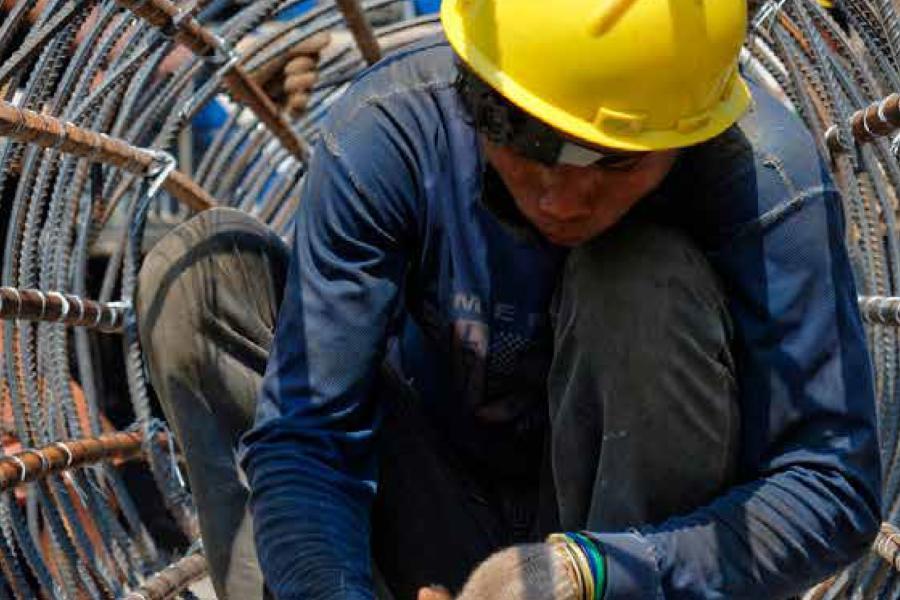UNOPS-managed Livelihoods and Food Security Fund estimates that one in six Myanmar workers in low-skilled employment is in a situation of forced labour
၂၀၂၁ ခုနှစ် ဩဂုတ်လ ၀၆ ရက်။
Yangon, Myanmar - In the first major study on the prevalence of forced labour in Myanmar since 2015, the UNOPS-managed Livelihoods and Food Security Fund (LIFT) shows that one in six workers in low-skilled employment is in a situation of forced labour due to multiple gaps in existing labour protection frameworks.

The LIFT-funded report From the Rice Paddy to the Industrial Park: Working Conditions and Forced Labour in Myanmar’s Rapidly Shifting Labour Market assesses the practical experiences of over 2,400 low skilled workers in relation to freedom of association, wage protection, equal treatment of women, access to justice and other key labour rights.
The study reveals that despite advances being made in increasing workers’ rights, 91 percent of interviewed workers had no formal contract and 93 per cent of workers had no access to social security. This is largely attributed to the decades under neglect - leading up to 2000 - when workers in Myanmar were left without access to basic rights and unprotected by an outdated legislative framework. While reforms to labour governance were initiated in 2010, the labour market itself has continued to be dominated by informality and poor working conditions.
The research findings showed an alarming prevalence of the two elements of forced labour, ‘involuntary work’, experienced by a staggering 63 per cent of workers and ‘threat or menace of penalty’ among low-skilled workers reported by 19 percent of respondents.
Not being told about dangerous working conditions (32 per cent), working for very low wages (25 percent), degrading living conditions in employer-provided housing (16 per cent) and a job that differed to what was agreed upon (11 per cent) are named as the most common forms of involuntary work. These and other findings suggest a high prevalence of exploitative employment practices and a lack of decent work opportunities for workers which are compounded by considerable practical restrictions on freedom of association and collective bargaining as well as by limitations in the reach or effectiveness of available assistance.
The study also provides evidence of the informality of the labour market information system, with over 50 per cent of workers reporting having found jobs by word of mouth and 47 per cent securing their employment through direct hire by the employer. Only (1 per cent) of workers interviewed were recruited through a labour broker (pwe sar in Myanmar language).
The COVID-19 pandemic further accentuated workers’ vulnerabilities with the survey finding that nearly three-quarters of low-skilled workers (73 per cent) reported some reduction in income during COVID-19, while (43 per cent) lost their jobs entirely.
Following the 1 February military takeover of government and the current COVID-19 third wave there has been a further dramatic rise in unemployment amounting to up to 1.2 million job losses in the second quarter of 2021. The sectors hardest hit are those that are the focus of this study, construction, garments, tourism and hospitality. All indications are that the unfolding political and socio-economic crisis will roll back years of hard-fought gains made in expanding labour protection during recent years, particularly through the suppression of trade unions and labour organisations.
“The study provides a critical line in the sand for the status of working conditions before the military’s declaration of a state of emergency and the outbreak of the third wave of COVID-19,” remarked LIFT Fund Director Katy Webley. “The situation of forced labour in Myanmar was significant before 1 February, but there were many individuals and organisations working together to create a momentum of change; the past few months however have seen the situation deteriorate dramatically.”
Mass loss of employment and increased desperation for income will increase the vulnerability of Myanmar’s workers to exploitative labour practices and forced labour both in Myanmar and abroad. The impact of the political situation on workers in Myanmar must continue to be monitored closely with decisive actions taken to ensure that fundamental labour rights are safeguarded from abuse. LIFT’s donors remain committed to supporting the resilience and sustainable livelihoods of poor and vulnerable groups in Myanmar.
The research report can be viewed here: From the Rice Paddy to the Industrial Park: Working Conditions and Forced Labour in Myanmar’s Rapidly Shifting Labour Market

အဲလစ်စဘတ်တာ ဇယ်လ်ကိုင်း




